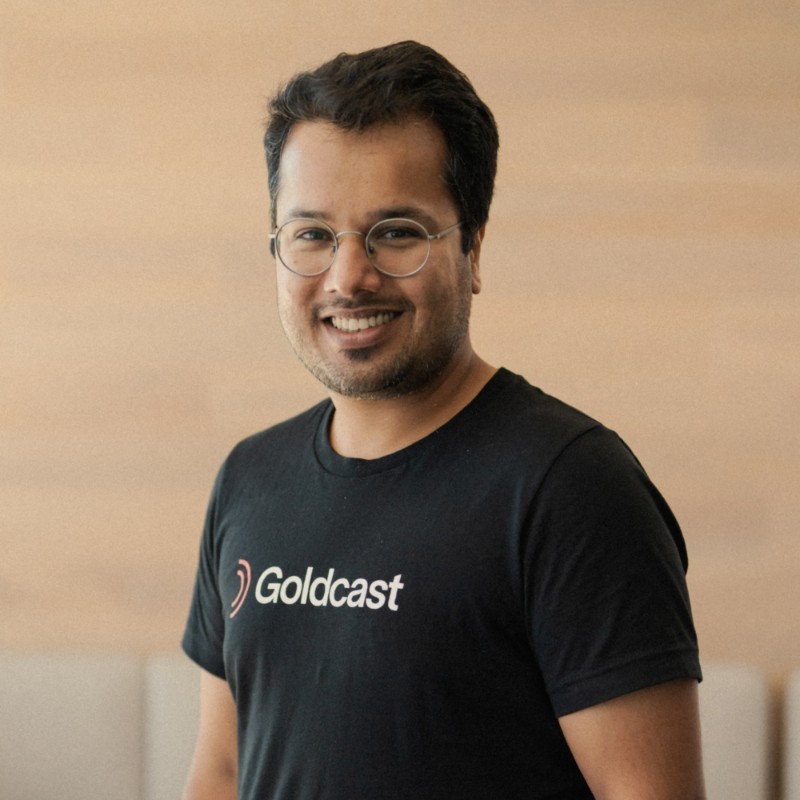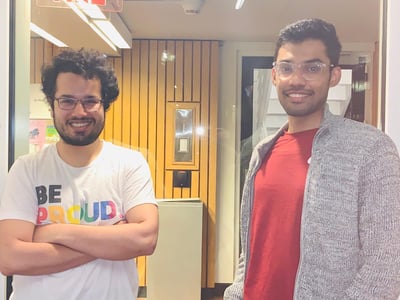Goldcast CEO Palash Soni Helps Empower B2B Marketers


With the rise of remote work, finding ways to engage digitally has become crucial for businesses. For B2B marketers in particular, digital events are key for reaching prospects and customers globally. That need is what drove three Harvard MBA students to found Goldcast, a new-age digital events platform designed for B2B marketers.
Palash Soni is the CEO & Co-Founder of Goldcast alongside COO & Co-Founder Kishore Kothandaram. They founded the company to empower B2B marketers to use events as a key go-to-market (GTM) activity by helping them host incredible experiences. Palash and Kishore, along with now 100+ teammates, are working together to revolutionize events that will help businesses drive revenue.
HubSpot for Startups spoke with Palash to learn about the origin of Goldcast, the challenges he faces as a CEO, and the advice he has for aspiring CEOs.
 Prior to founding Goldcast, Palash and Kishore met at a cohort networking event in India, facilitated by Harvard Business School (HBS). The two hit it off from the start and began collaborating immediately. Palash said he was instantly impressed by Kishore’s “hustling” and he could tell he was the kind of guy that “gets into doors and opens those doors.”
Prior to founding Goldcast, Palash and Kishore met at a cohort networking event in India, facilitated by Harvard Business School (HBS). The two hit it off from the start and began collaborating immediately. Palash said he was instantly impressed by Kishore’s “hustling” and he could tell he was the kind of guy that “gets into doors and opens those doors.”
“I think one thing that stands out and makes Kishore a great co-founder and a great entrepreneur is that he was just transitioning out of a job and wanted to learn about tech startups—so he messaged me after seeing that I was building a startup and asked about internships.”
Kishore is by inclination, not a people manager and more of a strategic thinker, so the two determined that he would be best suited for the role of COO, while Palash’s strengths lie more with people and culture—making him the better choice for CEO. They were both very aligned on that decision and consistently worked well together with different ideas and projects, so they decided to start exploring business ideas.
Palash used to sell to businesses and was familiar with sales and marketing platforms like HubSpot. Since he built similar products, he knew how they fit into the puzzle, how hard it was to prove the ROI of events, and the challenge marketers faced orchestrating them. When their other ideas didn’t pan out, they started thinking about how it would be cool to build a CRM for events and connect with CRM tools to help make events more measurable, and they saw digital events as an upcoming venture.
“With digital content, events could go from being one-off to a more repeatable, adaptable, and measurable marketing activity where you can obtain a lot of insights. You can also orchestrate a full go-to-market activity around the event and have touchpoints with audiences through digital events—which is much more affordable than in-person events. That was the genesis of Goldcast.”
Goldcast is in a competitive space, but Palash believes its differentiation stems from its strategy.
“The strategy comes from what we believe in, and the vector that we are going after. We are solving the problem of event marketing and we aim to make events go from a one-off marketing channel to recurring events.”
There are a few things that they’ve done to help set the company apart. One is their go-to-market process, as they are the only company doing that and they have a great community of followers, of their content, and of their events.
It’s deliberately orchestrated and they can run a 50-person webinar for up to five 7,000 attendee conferences. According to Palash, “total market orchestration equals the value of actionable activities at events such as data and analytics.”
Goldcast is also integrated with HubSpot which yields top prospect registrations at events, and the team handles tech on the back end to make things easier and more productive.
One of Palash’s biggest challenges as a CEO was determining which market to approach, in a competitive space with many players competing for digital events. In the early days, he wasn’t sure if he was doing the right thing—and if they should focus on a specific segment or go for a wider arena. They decided to target universities, as they are often willing to pay up to $60,000 for events. So, they also went after trade shows but weren’t sure if that strategy would be successful. Today Goldcast has a broad B2B audience.
Palash said another challenge has been operating in a 100% remote environment, as that adds complexity. They work really hard to maintain a culture where employees “gel” together, but keeping morale high is difficult with so many different types of people with different preferences and managerial styles.
There’s also the expectation of coaching employees which is a complex process involving operations. To improve his skills, Palash has been working with an executive coach, Mark Organ, CEO of Categorynauts, the leading global community of category creating leaders. He also has a great support system that includes members of the company’s board and CEO communities.
Additionally, Palash said that in the early days being an immigrant in the VC space was challenging because he had never been to the US before. He didn’t have a network or community of people to rely on, and finding investors and employees wasn’t easy. Immigration was also difficult at the time, but he did not feel there was any bias against him as an immigrant.
Palash has learned a lot from his journey as a CEO and he believes that success first requires having executives on board that are solid and well-aligned. He also advises aspiring CEOs to prepare in advance for growth by investing in HR practices and the implementation of cultural guidelines.
“You think about less when you are moving through the stages of growth quickly. And then it sneaks up on you and you have 50 then 100 employees—it’s like an explosion of people. You have to have a plan and be prepared for that by creating cultural guidelines and people practices. That was something I did not invest in, and it was a huge learning for me.”
Now expecting a second child, Palash said that remaining connected with the Indian community is more important than ever. Over the years, he feels he’s sort of lost touch and those relationships have diminished—mostly because Boston does not offer the same vibrant Indian community as a city like New York, for example.
“It’s important for me and my family to connect to the Indian community so we can celebrate with others and experience more of the culture than we could in just our own home alone.”
HubSpot for Startups provides founders with resources they need to grow and scale their companies. Startups can apply though over 4,000 partnering organizations to save up to 90% on their first year of paid HubSpot service, plus up to 30% off ongoing!
